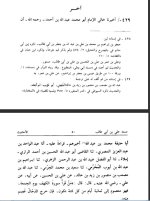The hadiith you are looking for is this one
مَنْ قَرَأَ سُورَةَ الْكَهْفِ يَوْمَ الْجُمُعَةِ ، فَهُوَ مَعْصُومٌ إِلَى ثَمَانِيَةِ أَيَّامٍ مِنْ كُلِّ فِتْنَةٍ تَكُونُ ، فَإِنْ خَرَجَ الدَّجَّالُ عُصِمَ مِنْهُ
He who recites Suurah al-Kahf on Friday, he is safe for eight days from any fitnah which comes to be. If al-Dajjaal comes, he will be safe from him.
This particular hadiith is very weak.
Let's look at the chain of this very weak hadiith
al-Qaadii Abu Abd Allaah al-Husain bin 'Ahmad al-Raazii -> 'Abu al-faDl 'ubaid Allaah bin Abd al-Rahmaan al-zuhrii ->
'Abu 'ishaaQ 'ibraahiim bin Abd Allaah bin 'ayyuub al-makhramii -> Sa'iid bin Muhammad al-jarmii ->
Abd Allaah bin MuS'ab bin Mansuur bin Zaid bin Khaalid -> Ali bin al-Hasan -> from his father -> Ali (may Allaah be pleased with him)
In the red you see the two narrators which make this hadiith very weak.
The first is:
'Abu 'ishaaQ 'ibraahiim bin Abd Allaah bin 'ayyuub al-makhramii
There is a difference of opinion regarding him.
al-DaaraQutni said: He is not reliable. He narrates baatil ahadiith from reliable narrators.
Others have said he is Suduuq
The second narrator is
Abd Allaah bin MuS'ab bin Mansuur bin Zaid bin Khaalid
His state is not known to the scholars of hadiith. He could be reliable, weak, or even one who fabricates ahadiith. When the scholars of hadiith do not know about the state of a narrator, then the chain becomes weak.
Based on these two narrators the hadith becomes very weak.
That is why
Shiekh al-albaani graded it weak and so did
Muhammad bin Abd al-Haadii. He said this hadiith does not have a chain and if it does then the critics from the people of knowledge do not use such a chain for evidence.
The author of the book you mentioned in which this narration is present is Diya al-Din al-Maqdisi.
Below is a screenshot of the hadiith from the book


